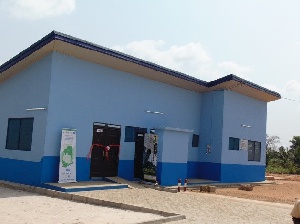The Director General (DG) of the Ghana Health Service Dr. Anthony Nsiah-Asare has commended United States Agency for International Development (USAID) Systems for Health project and the Korean International Cooperation Agency (KOICA) for supporting community health services with the construction and donation of new CHPS compounds to four communities in Ketu North and South Districts of the Volta region.
The Director General’s remarks were contained in a speech read for him at a ceremony to handover the four new CHPS compounds at Latokor community in the Ketu South District. The beneficiary communities are Lotakor, Glitame, Kasu and Klenormadi all in the Ketu North and South districts of the Volta Region.
The construction of the CHPS compounds was made possible by the partnership support of the two international development partners USAID Systems for Health project and KOICA in collaboration with the Ghana Health Service with support from the beneficiary communities.
The Director of Policy Planning Monitoring and Evaluation Division of the Ghana Health Service Dr. Koku Awoonor who spoke on behalf of the Director General appealed to the Chiefs and people of the beneficiary communities to continue to rally support for all health projects in their areas and ensure they take advantage of the facilities to seek regular care for their health needs especially pregnant women, adolescents and children.
Dr. Awoonor stated that the Ghana Health Service appreciates and recognizes communities as partners in health care delivery; a strategy that he said has worked well for the benefit of both the health service and communities in all parts of the country through the Community-based Health Planning and Services (CHPS) program.
He appealed to the communities to provide security for the Community Health Officers (CHOs) posted to the facilities and support the health staff as well as the health committee and volunteers to work smoothly to support health care delivery.
He reminded communities that CHPS have a limited role of providing health promotion, education, immunization, disease surveillance and emergency referral hence communities should be mindful not to overburden them with demands for drugs and treatment because that is not their core function.
“We must endeavor to promote our health through diseases prevention and health education. The Community Health Officers are positioned to support your communities in this regard” he said
The USAID Ghana Country Mission Director Sharon Cromer said the importance of having a CHPS compound equipped where nurses are able to reside and provide 24-hour services is important for providing quality health care. She acknowledged the critical contribution of the communities to the project and said she was hopeful the community people would own and manage the facilities in collaboration with the Ghana Health Service for long lasting benefits.
The Deputy Country Director of Korean International Cooperation Agency (KOICA) Mr. Seungmin Oh in his speech observed that despite Government efforts the funding gap in the health sector is huge as a result one development partner cannot do everything alone hence, there is the need to harmonize the support in order to avoid duplication of resources.
He said KOICA collaborates with USAID in other aspects of health delivery including the Project for Improving Maternal and Child Health in the Volta region, which ended recently and was hopeful that such partnerships among funders, government and communities will go a long way to improve health in Ghana.
In his address, the paramount Chief of the Klikor Traditional Area Togbe Addo VIII showered words of praise for the donors and the Ghana Health Service. While noting the importance of the health facilities to his people Togbe Addo VIII pledged his support and the communities’ assistance in maintaining and utilizing the facilities.
He appealed to the community members to take their health needs and their family members seriously. He advised the communities to embrace family planning services in order to protect women and children and curb the population explosion in the area.
The four CHPS compounds each comprised of a fully equipped service area, water and sanitation facilities and staff accommodation.
General News of Thursday, 4 January 2018
Source: roger a. agana

















